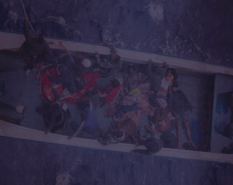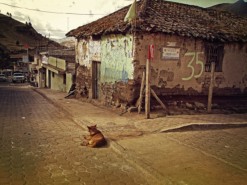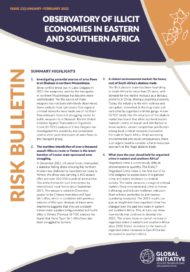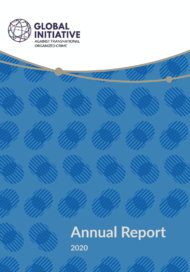Posted on 20 May 2020
Although the Western Balkans Six have not been as severely affected by the pandemic as other European countries, there is a risk that the unfolding economic crisis will intensify the region’s vulnerability to organized crime and corruption.
As of 15 May, 225 had died from the pandemic in Serbia, 128 in Bosnia, 95 in North Macedonia, 31 in Albania, 29 in Kosovo and 9 in Montenegro. In the short term, criminality in general has been reduced as a result of the lockdowns imposed by governments of the Western Balkans. The number of homicides has dropped, and the number of human-smuggling cases is also down as a result of tighter border controls.
However, when it comes to drug trafficking, there seems to have been little disruption. Heroin originating in Turkey continues to flow into the region, transported in trucks importing food and clothing. And cannabis, which is grown in the region, is still being exported, as witnessed by a seizure on 29 April of about a tonne of the drug in Italy, believed to have been transported from Albania by speedboat.
Smuggling of drugs through uncontrolled maritime and land borders is believed to have increased, as official crossing points have been closed down by authorities in the region. Meanwhile, traffickers are taking advantage of the fact that the attention of the police has now been turned to enforcing lockdowns. All the while, demand for drugs remains steady.
COVID-19 arrived at exactly the same time as the cannabis planting season. It remains to be seen, however, whether the lockdown will disrupt cultivation, or whether there will be a bumper crop as law enforcement is diverted to duties around policing the national restrictions currently in place. It is worth noting, however, that on 12 May, two people were arrested in Albania for cultivating 2 500 cannabis plants.
Cocaine produced in Latin America enters European ports by container ship. Groups from the Western Balkans are known to be involved in this transnational trade and, although delivery of supplies has not been affected by the pandemic, it has apparently become more difficult for intermediaries from Western Balkan criminal groups to pay for the shipments of cocaine.
As has been the case in other parts of the world, some prisoners in the region’s jails have been released in an effort to contain the spread of the virus. On 23 March, legislation enabled 570 prisoners to be released for three months. The prisoners had short terms left to serve, had chronic diseases, or were above the age of 60. In April, parliamentarians in Montenegro proposed an amnesty to reduce the duration of prison sentences. It is a policy that has been opposed by relatives of victims. At the time of writing, the parliament of Montenegro was expected to vote on the amnesty law.
The crisis has also highlighted endemic shortcomings in the healthcare systems of Western Balkan countries, caused in part by corruption. Worse still, some officials have taken advantage of the crisis to make a quick buck at the expense of people’s health and taxpayer’s money.
Corruption is particularly evident in the procurement of medical equipment and supplies. In Bosnia, it is alleged that a business involved in fruit imports, without any previous experience of procuring or distributing medical equipment, bought $5.8 million worth of ventilators from China without following regular procurement procedures. Most of the ventilators turned out to be unsuitable for COVID-19 patients. Similarly, a company in Sarajevo said to have political connections won a contract to supply protective masks. The firm had previously sold pastries in shopping malls.
In two other cases, lucrative contracts to build an isolation ward in Srebrenik, a town in the Bosnian Federation, and a field hospital in Republika Srpska seem to have been awarded without due diligence.
Restricted freedoms and economic vulnerability
Civil society in some countries of the region have expressed concern at measures such as states of emergency that have been imposed in Serbia, North Macedonia and Republika Srpska, part of Bosnia and Herzegovina. Elections due to be held in North Macedonia and Serbia have been postponed. Recently, American NGO Freedom House dropped Serbia and Montenegro from its list of democracies.
Over the weekend of 16–17 May, Albanian police violently broke up a protest against the demolition of the historic National Theatre in Tirana. Protestors were outraged that, following much debate over the future of the theatre, the government chose to demolish the building during the COVID crisis, a time when mass gatherings are banned.
There is also concern that some governments will use the emergency to further restrict freedom of the media and silence opposition. Journalists in Vojvodina, Serbia, have pointed to lack of transparency in the purchasing of medical equipment and other measures during the crisis. In Serbia, one journalist was detained by police after merely reporting on how the staff of the Novi Sad city hospital faced shortages of protective gear.
Long before the pandemic spread across Europe, the economies of the Western Balkan countries were already vulnerable. Additional economic hardship triggered by a prolonged pandemic will have a detrimental impact on the region, especially if much needed income from tourism and remittances falls. At the same time, while borders remain closed, it will be hard for people from the region to move abroad, particularly to the EU and Turkey where they commonly seek employment. Consequently, there could well be a major increase in unemployment in the region, and this could worsen the socio-economic challenges that have partly given rise to certain hotspots in the region where there is a propensity for organized crime.
Furthermore, if governments – constrained by dwindling revenues to their budgets as a result of the stalling regional economies – find it harder to deliver essential public services to citizens, others, with corrupt or criminal backgrounds, may fill the void, as we have reported elsewhere.
In short, while the Western Balkans have thus far been spared a major health crisis, they will require support to strengthen their resilience against the socio-economic consequences of the pandemic.
Cover: Constantine H. – Quarantine in Albania – 22 March 2020



